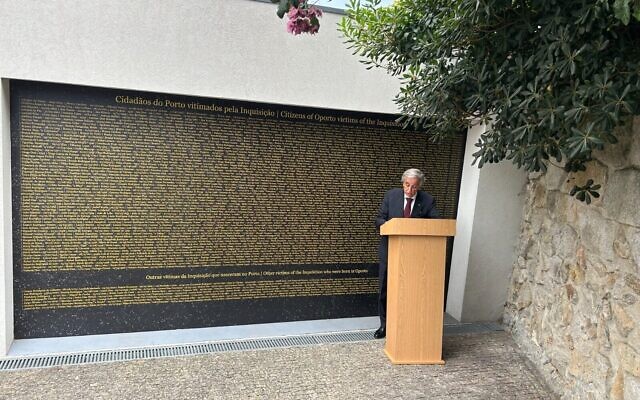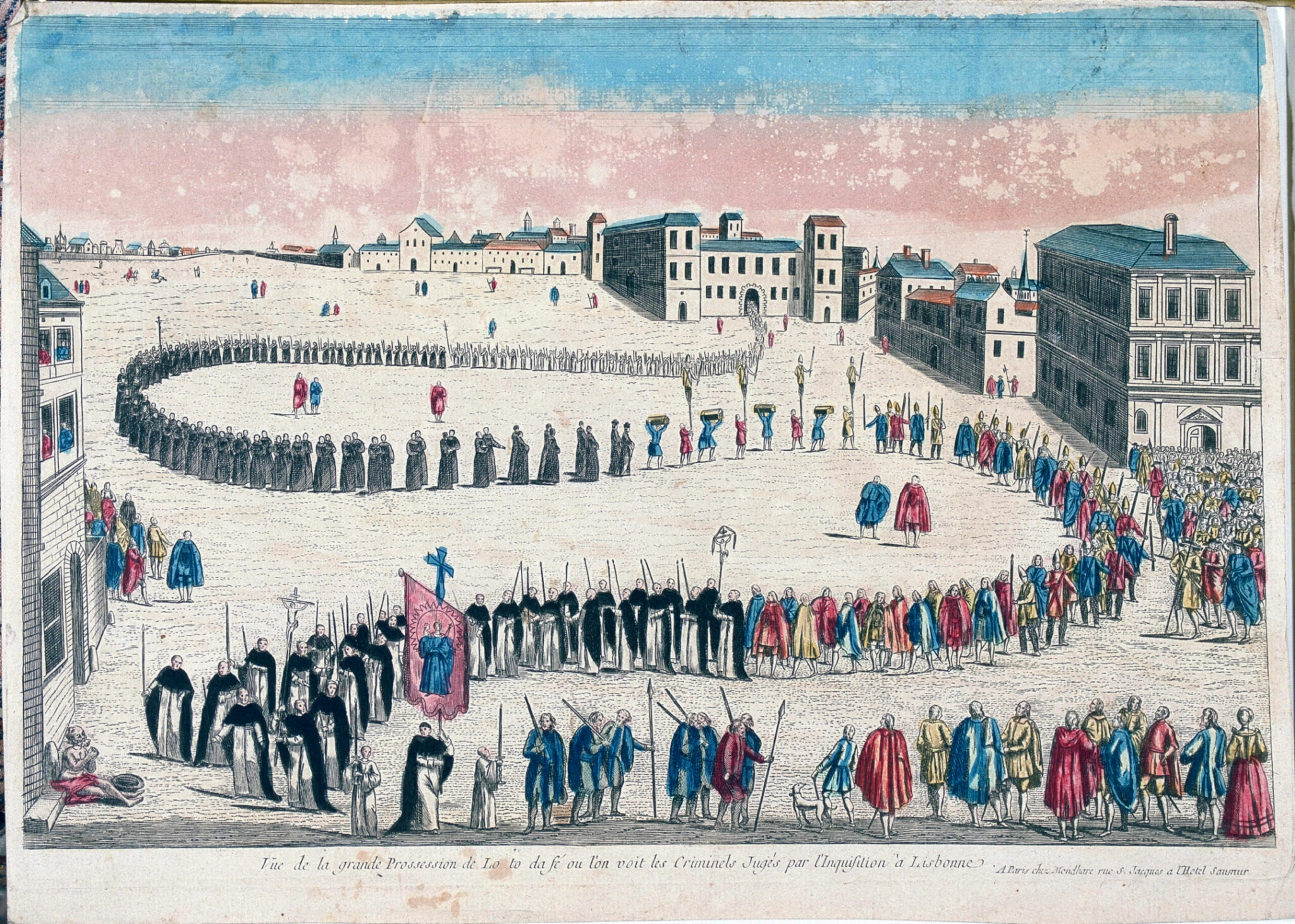Porto’s Jewish community unveils memorial to 842 local victims of Portuguese Inquisition
Victims killed or expelled from 1536 to 1821 were aged between 10 and 110 years old

In this city on Portugal’s northwestern coast, a small Jewish community has dedicated years to identifying its predecessors who were killed or expelled in the Portuguese Inquisition of 1536 to 1821.
Drawing on newly digitized records, the community was able to identify 842 people, ranging from 10 to 110 years old, who were victims of the Inquisition locally. On Sunday, it inaugurated a memorial engraved with their names.
The memorial, dedicated during a special event called the European Day of Jewish Culture, measures 13 feet wide by 6.5 feet high and is installed on an exterior wall of Porto’s Jewish Museum.
The museum is one of several institutions that have flourished in recent years as Porto, which is home to roughly 1,000 Jews today, has benefited from a swell of interest among tourists and descendants of Sephardic Jews expelled from the region who for the last eight years have been allowed to apply for citizenship.
But while the citizenship law has given rise to new investments in contemporary Jewish communities, Portugal still has a dearth of education about the Inquisition, according to Hugo Vaz, the curator of Porto’s Jewish Museum and Holocaust Museum. Although references have begun to make appearances in the curricular manuals for Portuguese schools, many students are asked to learn little about the Jewish population that was all but stamped out of their country over three centuries.
“I am 35 years old, and when I learned about the Inquisition in school, I learned that the Inquisition was the hunting of witches,” Vaz told the Jewish Telegraphic Agency. “I learned that in less than five minutes.”

Comparatively, Holocaust education has improved. Portugal was officially neutral in World War II and became a passageway for many Jewish refugees, making that episode of its history more favorable than the “black page” of the Inquisition, said Vaz.
Next to each name on the memorial is the date of the victim’s auto-da-fé, a public ceremony in which people were sentenced by the Inquisition. Some were sentenced to death and burned alive on that date, others imprisoned and tortured, others expelled and others forced to wear the “sambenito” — a humiliating outfit that featured crosses or painted devils and flames, as well as a conical hat — for the rest of their lives. The elaborate ceremonies usually took place in Portugal’s largest squares.
Most of the victims were accused of practicing Judaism by their neighbors, such as business rivals or former housekeepers, said Vaz. Historians believe it is possible that many victims, especially by the late 17th century, were assimilated Catholics who did not keep Jewish traditions at all.
Porto’s memorial wall was facilitated by the community’s digitization of records from the National Archives in Lisbon, said Michael Rothwell, director of the Jewish Museum and Holocaust Museum.
“Over the last number of years, there has been a big effort to put all those records online,” Rothwell told JTA. “Our community is supporting the restoration of all the case files that are rotting away. The ones that were in good condition have been scanned and put online, so we were able to do research online to find the Jews in the Inquisition who were from Porto.”
The community has hired historians to study the cases of all 842 people on the memorial and plans to publish a book on their stories next year.
Vaz hopes that learning more about these victims, such as a 10-year-old child accused together with their family, will encourage deeper education about the centuries-long period of persecution.
“A 10-year-old child doesn’t have consciousness of what religion means,” he said. “For me it’s unbelievable thinking about a nation persecuting everyone, including the kids, for practicing something they actually were not very well aware of.”

Thank you for helping to make Jewish News the leading source of news and opinion for the UK Jewish community. Today we're asking for your invaluable help to continue putting our community first in everything we do.
For as little as £5 a month you can help sustain the vital work we do in celebrating and standing up for Jewish life in Britain.
Jewish News holds our community together and keeps us connected. Like a synagogue, it’s where people turn to feel part of something bigger. It also proudly shows the rest of Britain the vibrancy and rich culture of modern Jewish life.
You can make a quick and easy one-off or monthly contribution of £5, £10, £20 or any other sum you’re comfortable with.
100% of your donation will help us continue celebrating our community, in all its dynamic diversity...
Engaging
Being a community platform means so much more than producing a newspaper and website. One of our proudest roles is media partnering with our invaluable charities to amplify the outstanding work they do to help us all.
Celebrating
There’s no shortage of oys in the world but Jewish News takes every opportunity to celebrate the joys too, through projects like Night of Heroes, 40 Under 40 and other compelling countdowns that make the community kvell with pride.
Pioneering
In the first collaboration between media outlets from different faiths, Jewish News worked with British Muslim TV and Church Times to produce a list of young activists leading the way on interfaith understanding.
Campaigning
Royal Mail issued a stamp honouring Holocaust hero Sir Nicholas Winton after a Jewish News campaign attracted more than 100,000 backers. Jewish Newsalso produces special editions of the paper highlighting pressing issues including mental health and Holocaust remembrance.
Easy access
In an age when news is readily accessible, Jewish News provides high-quality content free online and offline, removing any financial barriers to connecting people.
Voice of our community to wider society
The Jewish News team regularly appears on TV, radio and on the pages of the national press to comment on stories about the Jewish community. Easy access to the paper on the streets of London also means Jewish News provides an invaluable window into the community for the country at large.
We hope you agree all this is worth preserving.





















